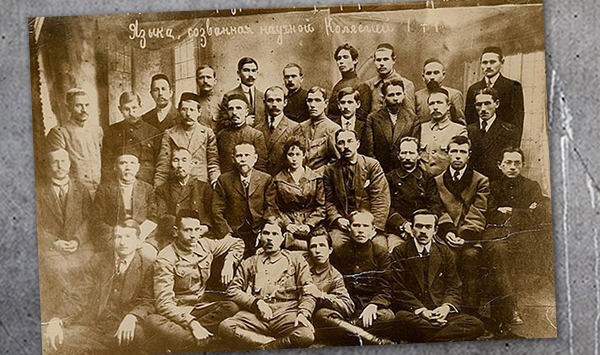Français | English
Affe…
The days will return of spring’s reunion with summer and the peasant’s eyes will still search the clouds. Will it rain? And if so, when?
That year, not a single drop of rain fell on the village. While clearing out dried branches in the garden plantations, my grandmother constantly lifted her head, looking dispairingly at the sky. Arms crossed on their chest, the neighborhood women gossiped about the lack of water.
There were only a few days left before school holidays and, I seem to remember, it was a weekend. With Jules Verne’s books on my knees, I had stretched on on the ledge and I was travelling in another world. Neither the drought nor the rain were of any concern to me. My mother grabbed one of the earthen jugs resting in the sun by the door and disappeared. My father was about to wash, obviously. Shortly thereafter, he would walk by me, wrapped in his thousand year old bathrobe, mopping off his head, his eyes.
First, from the low end of the street, I heard the happy voices of children coming closer. I was almost at the end of Mystery Island but my curiosity had the best of me and I stood up at the door. A few houses lower down, in the middle of the street, a very loud bunch of children had gathered. Most of them were from our neighborhood. Surrounded by them, aunt Affe from the Kireççi family was walking with her grey donkey and raising a ruckus. From every house where Affe knocked, someone would come out, pour a jugful or a pailful of water over Affe’s head. The woman would then supply bags of bulgur, of bread or of butter which Affe stored in the bags on the donkey’s back. This strange ritual ended when Affe took the empty jug and broke it by smashing it on the ground. She was a woman with eyes the color of the sky, blond, tall, wet from the water poured on her head, her hair in a mess, shirt and underwear stuck against her plump body. Every time the water spilled over her, the children yelled as loudly as they could.
My mother, walking by with a tray filled with the tomatoes and cucumbers she had gathered in the garden, stopped for a moment and looked out on the street.
“Look”, she said. “Affe has become the rain bride!”
In the steppes, being the rain bride is the cure to the drought! The bravest woman in the neighborhood walked all day long from one house to another and gathered food against the water poured out on her. Pots and jugs were smashed. Affe was the bravest in the village because Affe was the only woman who rode a bicycle. Affe found an iron mine in Ziyaret mountain, Affe went hunting with her rifle on her shoulder and made a hit with each shot. Affe’s voice was so strong that she could call her son from the lower neighborhood and he would come running from Aydınaltı every time to join his mother. And most importantly, Affe was from our family, on my mother’s side!
The crowd moved toward our house. Affe knocked at our next door neighbours’. When the water was poured on Affe’s head, the jug slipped from the owner’s hand. It struck Affe on the head. Affe collapsed. The neighbour panicked, the children howled, the donkey got nervous. A bit later, with the donkey tied to the door, Affe sat in front of the ledge, silently. The water streaming off her formed a lake at her feet. We looked at each other.
“What is your name?” she asked me.
“Ercan.”
“You’re reading a book?”
“Yeth!”
“Apple of my eye, bravo, always go on reading, all right?”
A bit after this, my mother called aunt Affe. They both entered the house together.
I was again deep into the books. My aunt Affe came out with her hair washed, combed, wearing some of my mother’s dry clothes.
“Apple of my eye, bravo, she said once again when passing me. Bravo!”
She mounted her donkey and left.
Maria…
(…) Having communicated with the government in Ankara, Mustafa Suphi and his companions were on the road to join the struggle, but their road was cut off at Erzurum. They were denied access to the town and were re-directed toward Trabzon. 1
(…) The Istikbal newspaper and the Association for the Defence of National Rights 2 had begun the propaganda in order to incite the people…The gangs were led by Kahya Yahya 3 . It was on a Friday the people were told at the mosque that “Those who have massacred our descendants in Russia are coming.” So Mustafa Suphi and his companions had their road but off in Değirmendere. In January, it was rainy. They were attacked and all fifteen of them were dragged through the mud.
(…) They were forced aboard a ship. The ship which took sail in the wintry night was secretly followed by another. In this latter one were Kahya Yahya and his men. Two hours later, they caught up with the first boat, boarded it and attacked with knives and other weapons. Mustafa Suphi and the others were bound up and thrown into the sea. When the men returned in the early morning they had Meryem with them, she had been one of the fifteen. It is said that her true name was Maria. She was Mustafa Suphi’s companion and she was a communist. (B. Sönmez — Birgün).
Maria was first taken to Yahya Kahya’s. She attempted to inform the Russian consulate where she was being held. When the man carrying her letter turned out to be one of Yahya Kahya’s men, she was handed over to the home of Nemlizade Ragip Bey [a wealthy notable of the Black Sea region]. A bit later, Maria was offered as a “gift” to the population in Rize 4. After countless acts of torture and humiliations, she was killed and thrown into a communal grave in Trabzon.
The bitter memory of the 15, lost in the dark waters of the Black Sea never leaves us. As for the story of Maria, Mustafa Suphi’s brave companion, it is added to our pain.
While reading about Maria’s brave life, I was suddenly reminded of my aunt Affe. Maria is a relative for us all. She is our “rain bride”. She is our hope. She is the endless courage of our women. The untamable waters of the Black Sea, cascading in her silken hair are the cure to our droughts. This debt which we attempt to pay for my aunt Affe, with bread and wheat, we do not know how we can pay it back to Maria.
Because we carry this debt of toppling tyranny, lies and torture.
Ercan Kesal
(Excerpt of Zamanın İzinde — On the traces of time)
 Ercan Kesal, born September 12 1959 is an actor, director, writer and Turkish medical doctor. He holds a 1984 diploma from the Faculty of Medecine of Ege University. He worked as a doctor in the State Hospital of Keskin and in clinics in Balâ and surrounding districts. He began his acting career in 2002 with a role in Nuri Bilge Ceylan’s film Uzak. He also wrote the scenario for the film Bir Zamanlar Anadolu’da (Once Upon a Time in Anatolia) with Ebru and Nuri Bilge Ceylan. Beside his acting career, he has published several books, includingPeri Gazozu (2013), Nasipse Adayız (2015), Cin Aynası (2016), Bozkırda Bir Gece Yarısı (2017), Aslında… (2017) et Evvel Zaman (2014).
Ercan Kesal, born September 12 1959 is an actor, director, writer and Turkish medical doctor. He holds a 1984 diploma from the Faculty of Medecine of Ege University. He worked as a doctor in the State Hospital of Keskin and in clinics in Balâ and surrounding districts. He began his acting career in 2002 with a role in Nuri Bilge Ceylan’s film Uzak. He also wrote the scenario for the film Bir Zamanlar Anadolu’da (Once Upon a Time in Anatolia) with Ebru and Nuri Bilge Ceylan. Beside his acting career, he has published several books, includingPeri Gazozu (2013), Nasipse Adayız (2015), Cin Aynası (2016), Bozkırda Bir Gece Yarısı (2017), Aslında… (2017) et Evvel Zaman (2014).
Translation from French by Renée Lucie Bourges
We maintain the “Kedistan tool” as well as its archives. We are fiercely committed to it remaining free of charge, devoid of advertising and with ease of consultation for our readers, even if this has a financial costs, covered up till now by financial contributions (all the authors at Kedistan work on a volunteer basis). Support Kedistan, make a contribution.


 Ercan Kesal, born September 12 1959 is an actor, director, writer and Turkish medical doctor. He holds a 1984 diploma from the Faculty of Medecine of Ege University. He worked as a doctor in the State Hospital of Keskin and in clinics in Balâ and surrounding districts. He began his acting career in 2002 with a role in Nuri Bilge Ceylan’s film Uzak. He also wrote the scenario for the film Bir Zamanlar Anadolu’da (Once Upon a Time in Anatolia) with Ebru and Nuri Bilge Ceylan. Beside his acting career, he has published several books, includingPeri Gazozu (2013), Nasipse Adayız (2015), Cin Aynası (2016), Bozkırda Bir Gece Yarısı (2017), Aslında… (2017) et Evvel Zaman (2014).
Ercan Kesal, born September 12 1959 is an actor, director, writer and Turkish medical doctor. He holds a 1984 diploma from the Faculty of Medecine of Ege University. He worked as a doctor in the State Hospital of Keskin and in clinics in Balâ and surrounding districts. He began his acting career in 2002 with a role in Nuri Bilge Ceylan’s film Uzak. He also wrote the scenario for the film Bir Zamanlar Anadolu’da (Once Upon a Time in Anatolia) with Ebru and Nuri Bilge Ceylan. Beside his acting career, he has published several books, includingPeri Gazozu (2013), Nasipse Adayız (2015), Cin Aynası (2016), Bozkırda Bir Gece Yarısı (2017), Aslında… (2017) et Evvel Zaman (2014).
